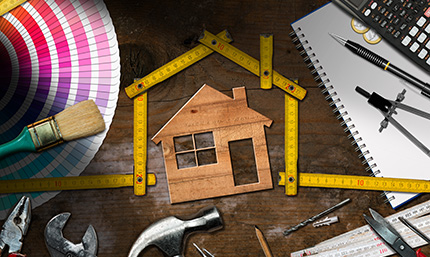News & Tips
Types of Home Loans at SCCU for Homebuyers

The process of financing a home can be challenging, even for buyers who have purchased property in the past. Whether you're a first-time homebuyer, moving up, or downsizing, Space Coast Credit Union (SCCU) offers a variety of mortgage options for your home purchase. To help you navigate the process, we've put together this guide to mortgage loans, including the types of financing available, tips on choosing the best mortgage lender for you, and more!
The Advantages of Home Ownership
What comes to mind when you think of owning a home? Having the freedom to design, decorate, remodel, or renovate? These are some of the obvious benefits of being a homeowner, but the advantages go well beyond aesthetics.
If you're just starting to consider becoming a homeowner, here are just a few of the benefits:
- Homeownership can help you build wealth. Historically, home values rise over the long term, so if you plan to retain ownership of your home for many years, you should see a significant return on your investment!
- You also build home equity with every monthly mortgage payment. Every time you make a payment, part of it goes toward reducing the principal amount you owe on your mortgage.
- A good record of making your mortgage payments on time can improve your credit score. That can translate into other financial benefits, such as qualifying for the best rates on other types of loans.
Types of Home Loans
Mortgages are not one-size-fits-all. Several factors will influence the type of home financing that's right for you, such as how long you plan to stay in the home, your down payment amount, what specific type of property you're seeking, and more. Here are the most common types of home loans and who they’re right for:
Conventional Home Loans
Many people ask, “What is the most common type of home loan?” The traditional, fixed-rate mortgage is the answer. This loan may be right for you if you expect to remain in your home for at least five years and want to have the most predictable principal and interest payments you can get. At SCCU, our 30-year fixed-rate mortgage and 15-year fixed-rate mortgage are popular choices. These conventional mortgage loans also give you the option of making additional principal payments with no prepayment penalty, which can save you more money in the long run.
Construction-to-Permanent Loans
When you're building a brand-new home, a construction loan is used to pay the home builder. With a construction loan in place, your lender makes payments to the builder in increments as each stage of construction work is completed. Upon completion of the home, your construction loan will be converted into a standard mortgage that you chose before construction began.
Adjustable-Rate Mortgages
An adjustable-rate mortgage—also referred to as an ARM or variable-rate mortgage—is a loan that has an interest rate that can go up or down. Typically, the loan starts with an interest rate that's lower than the interest rate on a similar fixed-rate mortgage for a specified time period. When that period of time expires, the interest rate may change, which will affect the amount of your monthly payment. Learn more about how they work here.
Condo Loans
If you’re looking to purchase a Florida condominium, lenders usually have special requirements of the condo property and association. These guidelines are addressed with a special condo loan. This loan may suit your financial needs best if you desire the carefree convenience of condo living or are considering a condo as a second or vacation home.
Jumbo Home Loans
A jumbo home loan allows you to finance your once-in-a-lifetime home and enjoy the luxuries of Florida—whether it be waterfront living, tropical estates, or a bird’s eye view of the city. This loan may suit your financial needs best if you are looking for a higher loan amount with a competitive interest rate.
Home Loan Types with Little to No Money Down
These mortgage loans give homebuyers a more accessible avenue to homeownership:
FHA Loans
These loans are insured by the Federal Housing Administration (FHA), which does not lend money, but backs lenders should the borrower default on the mortgage. FHA home loans offer affordable down payments—as low as 3.5% for some borrowers—and are often good choices for homebuyers with less-than-perfect credit. Keep in mind that FHA loans have some detailed requirements and restrictions.
VA Loans
As part of the GI Bill of 1944, our nation's veterans, widowed military spouses, and active duty service members can apply for a VA home loan to purchase a home. At SCCU, our VA loans offer a range of benefits, including up to 100% financing66, no private mortgage insurance (PMI) requirement (with certain qualifications), and the same great interest rate regardless of credit score.
Additional Home Loan Options to Save More Money
If you’d like to save more money on your down payment or closing costs, check out these options:
HERO Loans
We offer exclusive home loan options and rates for heroes: educators, medical professionals, first responders, law enforcement, military personnel, and Department of Defense/government contractors. More about HERO Loans here.
No Closing Costs Option
This option greatly reduces the amount of money you need at closing because it covers your third-party charges and waives lender origination fees. It’s available on several of our mortgages—an SCCU Team Member will be happy to provide more details. Learn more here.
No Down Payment Option
If fronting 20% for a home isn’t exactly doable, this option is available with select home loan types and puts homeownership within reach—ideal for first-time homebuyers
Affordable Housing Program
If you’re a first-time or hero homebuyer, then you could be eligible for funds in housing assistance (certain conditions apply).
What Mortgage Lenders Will Consider
A mortgage loan is a significant transaction on both sides of the table: It's likely the largest purchase most consumers will ever make, and lenders need to see the right financial indicators in order to extend a large amount of money to borrowers in the form of a mortgage loan. So, what do lenders look at when you start the application process? Here are the main factors:
- Credit: When lenders see that you have a solid history of paying your bills on time, it's a positive sign that you’ll repay your new mortgage loan on time. They will also obtain your credit score and full credit history to ensure there are no red flags. Because different types of loans can have different credit score requirements—and credit scores often affect the interest rate for which you qualify—be sure to ask potential lenders how your credit score will factor into your mortgage loan options.
- Income: In addition to having a history of paying bills on time, having the means to make your mortgage payment is, of course, essential. Lenders will want to see that you currently have sufficient income from a reliable source and an expectation that you will maintain sufficient income in the future.
- Assets and liabilities: Even with a steady income and great credit score, lenders will still want to evaluate your bigger financial picture, which includes the assets you have on hand and the debts you owe, such as car payments and credit card balances.
- Debt-to-income ratio: This ratio is the total of all of your monthly payments on debts divided by your gross (not net) monthly income. Higher debt-to-income ratios can be an indicator that a borrower may have difficulty making monthly mortgage loan payments in the future, but each lender will have its own specific requirements to qualify for their mortgage products.
Pre-Approval vs. Pre-Qualification
While some may use these terms interchangeably, each lender may have its own definition of pre-approval and pre-qualification. In general, however, pre-qualification comes first, followed by pre-approval. Pre-approval usually requires you to provide more in-depth information about your finances, such as tax records and proof of income.
At SCCU, we’ll assist you in getting pre-qualified for a home loan, which will result in giving you documentation that demonstrates to sellers and agents that you have the credit needed for a successful real estate transaction. One advantage of this is that you may have an edge over other interested buyers since your pre-approval status can be an indicator that the transaction will go more quickly and smoothly with you.
We offer fast mortgage pre-qualification decisions, both online and over the phone.
| Término | Tasas desde | APR* "As Low As" | Ejemplo de cantidad del préstamo | Ejemplo de pago mensual |
|---|---|---|---|---|
| 10 Años - Purchase or Refi | 6.250% | 6.530% | $200,000 | $2,245.60 |
| 15 Años - Purchase | 6.375% | 6.574% | $200,000 | $1,728.50 |
| 15 Años - Refinanciamiento | 6.500% | 6.700% | $200,000 | $1,742.21 |
| 20 Años - Purchase or Refi | 6.875% | 7.037% | $200,000 | $1,535.63 |
| 30 Años - Purchase | 6.875% | 6.999% | $200,000 | $1,313.86 |
| 30 Años - Refinanciamiento | 7.000% | 7.125% | $200,000 | $1,330.60 |
Los pagos mensuales de ejemplo no incluyen impuestos ni seguro; la obligación de pago real será mayor.
HOME LOANS: Rates based on creditworthiness. Mortgage loans are originated by Space Coast Credit Union and are subject to credit approval, verification, and collateral evaluation. Programs, offers, rates, terms, and conditions are subject to change or cancellation without notice. Certain restrictions apply. Taxes and insurance not included; your actual payment obligation will be higher.
These mortgage loan programs constitute first mortgage liens secured by the home and property. Your down payment is determined by the Loan-to-Value ratio. (90% LTV = 10% down payment). Loans exceeding 80% of the appraised value of the home require private mortgage insurance. Member responsible for any funds needed for closing costs (unless member attached a No Closing Costs option to loan) and pre-paid escrow.
The Mortgage Lending Process
SCCU makes the home loan process simple for our members, with mortgage experts to guide you from start to finish. The steps in the mortgage process include pre-qualification, which includes submitting an initial application. We'll take a look at your credit history and overall financial position. You'll come away with a good idea of how much house you can afford before you go shopping. Keep in mind, however, that pre-qualification is not the final loan decision.
Once you've found the home you want to buy, the complete mortgage application process kicks in. This is when you'll know just how much you'll be able to borrow. You'll need to provide detailed information that substantiates your income, bank account statements, tax returns and more.
When all of your application documents have been completed, your application file will be moved into processing. This is also when the home will be appraised to ensure its market value is in line with the amount of the loan. Your loan processor will collect more information to get your file ready for underwriting review and approval. Don't be alarmed if you get a request from our underwriters for additional information or clarifications—it's a normal part of the approval process.
With underwriting approval in hand, the next step is closing on your new home loan. Before the closing meeting is set, you'll be provided with a closing disclosure that specifies the final terms of your loan and all of your closing costs, so you'll know how much money you will need to bring to closing. At closing, SCCU will fund the loan to the seller in exchange for the title to the property.
SCCU will continue to service your mortgage for the life of the loan, from the time you close on it until it's paid in full. You'll have our support anytime you need it. And, if you ever need to refinance or want to buy another property, we're here to help. Get more details on the homebuying process in Florida here.
Mortgage and Real Estate Terms
Confused by all of the unfamiliar terms and acronyms in the world of home buying? You're not alone! Here are a few of the most common terms you're likely to encounter during the process of searching for and financing your home:
- Amortization: This is the process of reducing the balance of or satisfying your mortgage debt with regular principal and interest payments over time. Your mortgage loan documents will include an amortization schedule, showing the amount of each payment that will go towards the principal and interest.
- Closing costs: Certain costs and fees are associated with the process of obtaining a mortgage, many of them are payable at the closing table and some are paid prior to closing. Closing costs may include title search fees, appraisal fees, credit report costs, and more. You'll be provided with a full accounting of your closing costs, so there should be no surprises at your closing meeting. You can learn more about our No Closing Costs mortgages vs. other home loan options here.
- Comps (or “Comparables”): One factor that goes into appraising the fair market value of your property is an assessment of other similar properties. Comps are homes within a close range of your desired property's location, features, amenities, and size that have recently sold.
- Deed: This document legally transfers ownership of the home from the seller to you at closing. In the process leading up to closing, lenders will verify that the buyer legally owns the property via a title search.
- Escrow: With an escrow, a third-party handles an account’s funds. In a real estate transaction, the buyer may deposit funds in escrow until certain qualifications are met. In many cases, your annual estimated homeowners insurance and property tax obligations will be in escrow too, and the lender will pay the insurance and taxes from your escrow account. Learn more about escrow here.
- Loan-to-value: The loan-to-value (LTV) ratio is the ratio between the principal amount of the mortgage loan and the appraised value of the property. An ideal LTV ratio is 80% or less.
- Origination fee: New mortgage loan applications may have an origination fee that covers the costs of putting a new loan in place. This fee is a percentage of the total amount of loan, usually in the range of one-half to one percent.
- Points: Qualified buyers may opt to lower or buy down the loan's interest rate by paying discount or mortgage points at closing. One point is equal to one percentage point of the amount being borrowed.
- Private mortgage insurance (PMI): Mortgage insurance protects lenders if borrowers default on their mortgage loans. PMI is often a requirement when the down payment is less than 20%, and may be removed when equity in the home reaches 20% of the home's appraisal value at the time it was purchased.
What to Look for in a Mortgage Lender
Here are some top tips when looking for a mortgage lender:
- Shop around and talk with several lenders. The best mortgage rates are important, of course, but there are many more things to consider. Ask plenty of questions of each lender you're considering, such as whether they offer the specific type of loan you're looking for.
- Take note of how initial conversations or meetings go with lenders. Are they helpful, friendly, and courteous? Do they respond to your calls promptly? Do they take the time to answer your questions in detail and explain the finer points of home financing? The mortgage lending process has many moving parts and frequent communication points, so you'll want to feel like you're in good hands with people you can trust.
- Get loan estimates from each lender. These will include important details such as fees, the interest rate, a breakdown of your monthly payment, and more. Loan estimates are required by law to help you make clear comparisons between lenders.
More About Home Loans at Space Coast Credit Union
We offer a variety of resources to help you get the best home loan for your needs. All of our mortgages come with no intangible tax21, fast pre-qualification decisions, an interest rate guarantee18, and member service for the life of the loan. Be sure to check out our mortgage estimator tool and our mortgage calculators.


































































































.jpg?width=430&height=257&ext=.jpg)




























